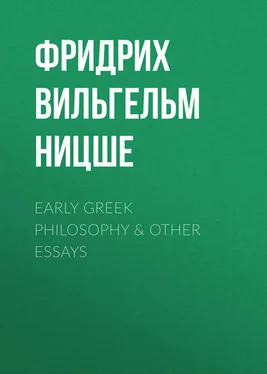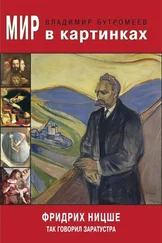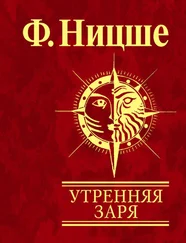Фридрих Ницше - Early Greek Philosophy & Other Essays
Здесь есть возможность читать онлайн «Фридрих Ницше - Early Greek Philosophy & Other Essays» — ознакомительный отрывок электронной книги совершенно бесплатно, а после прочтения отрывка купить полную версию. В некоторых случаях можно слушать аудио, скачать через торрент в формате fb2 и присутствует краткое содержание. Жанр: Философия, literature_19, foreign_antique, foreign_prose, на английском языке. Описание произведения, (предисловие) а так же отзывы посетителей доступны на портале библиотеки ЛибКат.
- Название:Early Greek Philosophy & Other Essays
- Автор:
- Жанр:
- Год:неизвестен
- ISBN:нет данных
- Рейтинг книги:3 / 5. Голосов: 1
-
Избранное:Добавить в избранное
- Отзывы:
-
Ваша оценка:
- 60
- 1
- 2
- 3
- 4
- 5
Early Greek Philosophy & Other Essays: краткое содержание, описание и аннотация
Предлагаем к чтению аннотацию, описание, краткое содержание или предисловие (зависит от того, что написал сам автор книги «Early Greek Philosophy & Other Essays»). Если вы не нашли необходимую информацию о книге — напишите в комментариях, мы постараемся отыскать её.
Early Greek Philosophy & Other Essays — читать онлайн ознакомительный отрывок
Ниже представлен текст книги, разбитый по страницам. Система сохранения места последней прочитанной страницы, позволяет с удобством читать онлайн бесплатно книгу «Early Greek Philosophy & Other Essays», без необходимости каждый раз заново искать на чём Вы остановились. Поставьте закладку, и сможете в любой момент перейти на страницу, на которой закончили чтение.
Интервал:
Закладка:
Friedrich Wilhelm Nietzsche
Early Greek Philosophy & Other Essays / Collected Works, Volume Two
TRANSLATOR'S PREFACE
The essays contained in this volume treat of various subjects. With the exception of perhaps one we must consider all these papers as fragments. Written during the early Seventies, and intended mostly as prefaces, they are extremely interesting, since traces of Nietzsche's later tenets – like Slave and Master morality, the Superman – can be found everywhere. But they are also very valuable on account of the young philosopher's daring and able handling of difficult and abstruse subjects. "Truth and Falsity," and "The Greek Woman" are probably the two essays which will prove most attractive to the average reader.
In the essay on THE GREEK STATE the two tenets mentioned above are clearly discernible, though the Superman still goes by the Schopenhauerian label "genius." Our philosopher attacks the modern ideas of the "dignity of man" and of the "dignity of labour," because Existence seems to be without worth and dignity. The preponderance of such illusory ideas is due to the political power nowadays vested in the "slaves." The Greeks saw no dignity in labour. They saw the necessity of it, and the necessity of slavery, but felt ashamed of both. Not even the labour of the artist did they admire, although they praised his completed work.
If the Greeks perished through their slavery, one thing is still more certain: we shall perish through the lack of slavery. To the essence of Culture slavery is innate. It is part of it. A vast multitude must labour and "slave" in order that a few may lead an existence devoted to beauty and art.
Strife and war are necessary for the welfare of the State. War consecrates and purines the State. The purpose of the military State is the creating of the military genius, the ruthless conqueror, the War-lord. There also exists a mysterious connection between the State in general and the creating of the genius.
In THE GREEK WOMAN, Nietzsche, the man who said, "One cannot think highly enough of women," delineates his ideal of woman. Penelope, Antigone, Electra are his ideal types.
Plato's dictum that in the perfect State the family would cease to exist, belongs to the most intimate things uttered about the relation between women and the State. The Greek woman as mother had to vegetate in obscurity, to lead a kind of Cranfordian existence for the greater welfare of the body politic. Only in Greek antiquity did woman occupy her proper position, and for this reason she was more honoured than she has ever been since. Pythia was the mouthpiece, the symbol of Greek unity.
ON MUSIC AND WORDS. Music is older, more fundamental than language. Music is an expression of cosmic consciousness. Language is only a gesture-symbolism.
It is true the music of every people was at first allied to lyric poetry; "absolute music" always appeared much later. But that is due to the double nature in the essence of language. The tone of the speaker expresses the basic pleasure- and displeasure-sensations of the individual. These form the tonal subsoil common to all languages; they are comprehensible everywhere. Language itself is a super-structure on that subsoil; it is a gesture-symbolism for all the other conceptions which man adds to that subsoil.
The endeavour to illustrate a poem by music is futile. The text of an opera is therefore quite negligible. Modern opera in its music is therefore often only a stimulant or a remembrancer for set, stereotyped feelings. Great music, i. e., Dionysean music, makes us forget to listen to the words.
HOMER'S CONTEST. The Greek genius acknowledged strife, struggle, contest to be necessary in this life. Only through competition and emulation will the Common-Wealth thrive. Yet there was no unbridled ambition. Everyone's individual endeavours were subordinated to the welfare of the community. The curse of present-day contest is that it does not do the same.
In THE RELATION OF SCHOPENHAUER'S PHILOSOPHY TO A GERMAN CULTURE an amusing and yet serious attack is made on the hollow would-be culture of the German Philistines who after the Franco-Prussian war were swollen with self-conceit, self-sufficiency, and were a great danger to real Culture. Nietzsche points out Schopenhauer's great philosophy as the only possible means of escaping the humdrum of Philistia with its hypocrisy and intellectual ostrichisation.
The essay on GREEK PHILOSOPHY DURING THE TRAGIC AGE is a performance of great interest to the scholar. It brims with ideas. The Hegelian School, especially Zeller, has shown what an important place is held by the earlier thinkers in the history of Greek thought and how necessary a knowledge of their work is for all who wish to understand Plato and Aristotle. Diels' great book: "Die Fragmente der Vorsokratiker", Benn's, Burnet's and Fairbanks' books we may regard as the peristyle through which we enter the temple of Early Greek Philosophy. Nietzsche's essay then is like a beautiful festoon swinging between the columns erected by Diels and the others out of the marble of facts.
Beauty and the personal equation are the two "leitmotive" of Nietzsche's history of the pre-Socratian philosophers. Especially does he lay stress upon the personal equation, since that is the only permanent item of interest, considering that every "System" crumbles into nothing with the appearance of a new thinker. In this way Nietzsche treats of Thales, Anaximander, Heraclitus, Parmenides, Xenophanes, Anaxagoras. There are also some sketches of a draft for an intended but never accomplished continuation, in which Empedocles, Democritus and Plato were to be dealt with.
Probably the most popular of the Essays in this book will prove to be the one on TRUTH AND FALSITY. It is an epistemological rhapsody on the relativity of truth, on "Appearance and Reality," on "perceptual flux" versus – "conceptual conceit."
Man's intellect is only a means in the struggle for existence, a means taking the place of the animal's horns and teeth. It adapts itself especially to deception and dissimulation.
There are no absolute truths. Truth is relative and always imperfect. Yet fictitious values fixed by convention and utility are set down as truth. The liar does not use these standard coins of the realm. He is hated; not out of love for truth, no, but because he is dangerous.
Our words never hit the essence, the "X" of a thing, but indicate only external characteristics. Language is the columbarium of the ideas, the cemetery of perceptions.
Truths are metaphors, illusions, anthropomorphisms about which one has forgotten that they are such. There are different truths to different beings. Like a spider man sits in the web of his truths and ideas. He wants to be deceived. By means of error he mostly lives; truth is often fatal. When the liar, the story-teller, the poet, the rhapsodist lie to him without hurting him he – loves them! —
The text underlying this translation is that of Vol. I. of the "Taschenausgabe." One or two obscure passages I hope my conjectures may have elucidated. The dates following the titles indicate the year when these essays were written.
In no other work have I felt so deeply the great need of the science of Signifies with its ultimate international standardisation of terms, as attempted by Eisler and Baldwin. I hope, however, I have succeeded in conveying accurately the meaning of the author in spite of a certain looseness in his philosophical terminology.
The English language is somewhat at a disadvantage through its lack of a Noun-Infinitive. I can best illustrate this by a passage from Parmenides :
χρὴ τὸ λέγειν τε νοεῑν τ' ἐὸν ἔμμεναι· ἔστι γὰρ εῖναι, μηδὲν δ' οὐκ ἔστιν· τά σ' ἐγὼ ψράζεσθαι ἄνωγα.
Читать дальшеИнтервал:
Закладка:
Похожие книги на «Early Greek Philosophy & Other Essays»
Представляем Вашему вниманию похожие книги на «Early Greek Philosophy & Other Essays» списком для выбора. Мы отобрали схожую по названию и смыслу литературу в надежде предоставить читателям больше вариантов отыскать новые, интересные, ещё непрочитанные произведения.
Обсуждение, отзывы о книге «Early Greek Philosophy & Other Essays» и просто собственные мнения читателей. Оставьте ваши комментарии, напишите, что Вы думаете о произведении, его смысле или главных героях. Укажите что конкретно понравилось, а что нет, и почему Вы так считаете.


![Фридрих Ницше - Песни Заратустры [сборник]](/books/28216/fridrih-nicshe-pesni-zaratustry-sbornik-thumb.webp)








